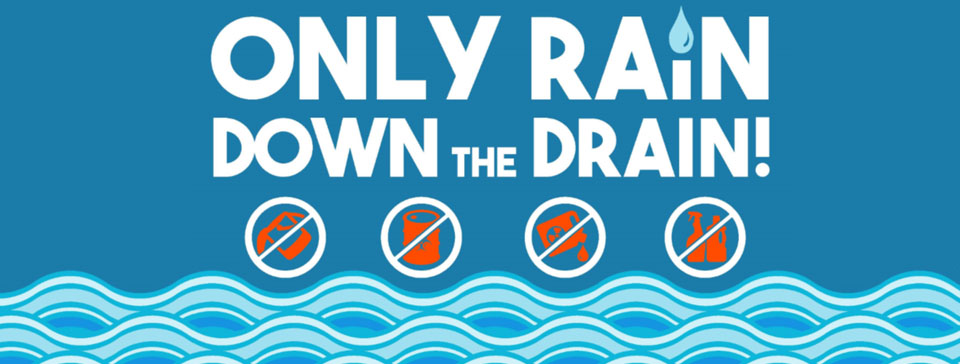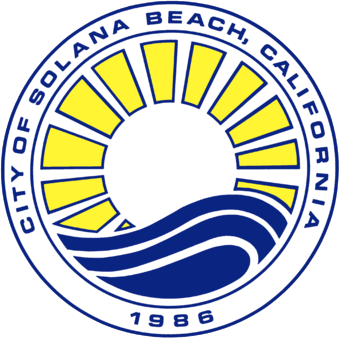STORM WATER PROGRAM
Storm Water Program (Water Quality)
The City of Solana Beach has a comprehensive storm water pollution prevention program. As mandated by the National Pollutant Discharge Elimination System Permit Order No. R9-2013-0001 (NPDES Permit) issued by the Regional Water Quality Control Board (RWQCB), the City is required to prevent and eliminate non-storm water discharges into the City's storm drain system. Non-compliance with the NPDES Permit can result in heavy fines to the City, up to $10,000 per day per violation. In order to stay in compliance, the City has a comprehensive program to reduce the amount of pollutants that are allowed to enter the storm drain system. This is important because storm drains are NOT connected to waste water treatment facilities, so the water that enters them flows directly to creeks, lagoons, and oceans untreated. The City of Solana Beach prohibits all non-storm water discharges unless a discharge is authorized by a separate NPDES permit. Typical non-storm water discharges include, but are not limited to:
- Oil from vehicles
- Excess pesticides and fertilizer from landscaping
- Bacteria from pet waste
- Sediment from construction and landscaping projects
- Soap from car washing
- Litter
- Lawn and garden debris
- Improperly disposed home improvement debris
- Irrigation runoff (e.g. over-spray and over-irrigation)
- Water from residential and commercial street, sidewalk, and parking lot washing (e.g. hosing down and high pressure washing)
- Air conditioning condensation
- Chlorinated swimming pool discharges
- Sanitary sewer and septic system overflows
Report Pollution
If you observe any of the following occurring, please immediately notify the City's Storm Water Program hotline via email or at (858) 720-4424, or submit an Urban Runoff Report Form online:
- Power washing or mobile detailing operations whose runoff is flowing into the sidewalk, curb and gutter, street, or a storm drain;
- Over irrigation where water is running off into the streets or storm drain system;
- Landscape crews using hoses to wash down driveways or gutters into the street;
- Restaurants washing their mats or equipment outdoors and allowing the runoff to flow into the streets or alleyways; or
- Construction materials or sediment coming off the property of construction sites and entering the City's right-of-way.
Prevent Pollution

To help prevent storm water pollution, please adopt the following practices:
- Dispose all pet waste in a trash can or in the toilet
- Apply fertilizer and pesticides sparingly and according to manufactures direction
- Adjust sprinklers to prevent over-watering
- Wash your car at a commercial car wash
- Maintain automobiles to prevent fluid leaks
- Sweep your hard surfaces (driveways, patios, sidewalks, etc.) and do not use water
- Ensure your contractors are adhering to all storm water regulations, ultimately the property owner can be held liable for work done on property, including fines
Jurisdictional Runoff Management Program (JRMP)
The San Diego Regional Water Quality Control Board (RWQCB) adopted the Municipal Storm Water Permit Order No. R9-2013-0001, National Pollutant Discharge Elimination System (NPDES) No. CAS019266 (Permit) which became effective on June 27, 2013, to control waste discharges in urban runoff from the Municipal Separate Storm Sewer Systems (MS4) draining the watersheds in the County of San Diego, the incorporated cities of San Diego County, San Diego County Regional Airport Authority, and the San Diego Unified Port Di strict, collectively known as Copermittees. Each Copermittee is required to implement a Jurisdictional Runoff Management Program (JRMP) to control the contribution of pollutants to and the discharges from the MS4 within its jurisdiction.
The City has a JRMP that governs the activities and programs implemented to comply with the NPDES Permit. The JRMP is broken up into the following sections, each with their own set of guidelines and requirements that City staff must adhere to and implement to stay in compliance with the NPDES Permit:
- Development Planning
- Construction
- Municipal
- Industrial and Commercial
- Residential
- Illicit Discharge Detection and Elimination
- Education
- Public Participation
- Fiscal Analysis
- Effectiveness Assessment
Documents
Solana Beach Jurisdictional Runoff Management Program
- Minimum Best Management Practices for All Discharges
- BMP Design Manual 2020
- BMP Design Manual Appendices 2020
- Checklist for Determination of Project Category
- Standard Project SWQMP
- Solana Beach JRMP GIS Files
- Solana Beach MS4 GIS Files
Carlsbad Watershed Management Area Water Quality Improvement Plan:
San Dieguito Water Quality Improvement Plan
Channel Maintenance Programmatic Permitting Guide
The City also has responsibilities above and beyond the requirements of the JURMP. The NPDES Permit requires the City to participate with neighboring jurisdictions and the entire region to develop and implement Watershed programs and a Regional Program. The City is in two separate watersheds, the Carlsbad Watershed and the San Dieguito Watershed, which each have pollution prevention programs called Watershed Urban Runoff Management Programs (WURMPs). City staff must develop and implement programs with staff from neighboring jurisdictions and the region to address water pollution on a much larger scale.
For questions about this program contact
Engineering (858) 720-2470
To report pollution contact
Storm Water Pollution Reporting Hotline (858) 720-4424
